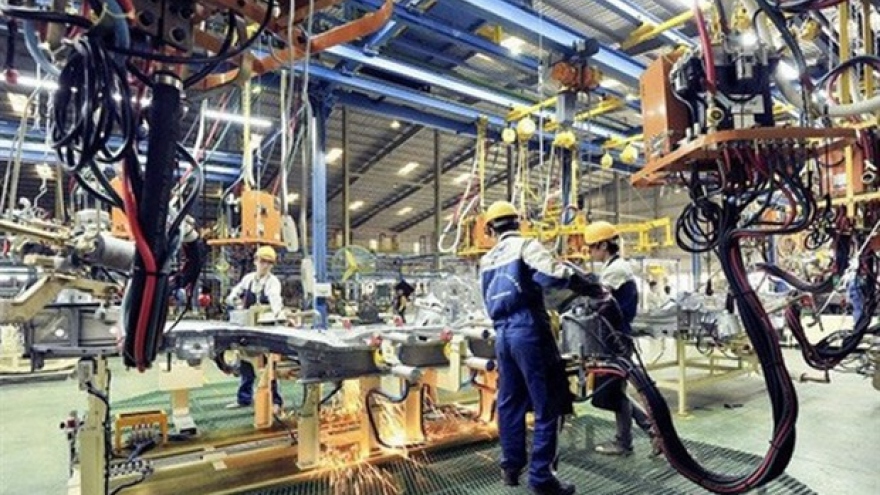Global manufacturers flocking to Vietnam, reports Nikkei Asia
VOV.VN - As part of the world’s largest financial publication, Nikkei Asia has published an article outlining how Vietnam is preparing for a shift of investment from the world’s giant manufacturing "eagles".

The article states that three years ago Jack O'Sullivan came to Vietnam to build premium electric bicycles, but factory after factory said it could not make the parts he needed, prompting him to settle on an unorthodox way of bringing them up to speed.
The Irishman then started dispatching employees from Modmo, the bike exporter he founded in 2017, to work alongside local suppliers. Today, Modmo sources approximately 50% of its components from Vietnam, a number O'Sullivan anticipates will rise due to the need to source more parts locally.
The article outlines that the country is currently enjoying an influx of foreign manufacturers, a trend that first began after 2007 when low-end garment and shoe factories began to leave China due to rising costs.
At present Vietnam is hoping to become a major hub for high-tech manufacturing, as the United States’ pressure on China is forcing a re-alignment of global supply chains that support the computer, smartphone, and telecom industries. Already, Samsung alone makes up a quarter of Vietnamese exports, with Intel selecting the country to house its biggest chip assembly plant worldwide.
The article points out that for all global manufacturers, over-reliance on China has become increasingly precarious in the wake of the US trade war, pandemic-related supply chain disruptions, and higher costs. Their relocation to neighbouring Vietnam has helped to boost the domestic manufacturing sector, which at its peak saw annual growth of 21% in February, before the novel coronavirus (COVID-19) lockdown began.
Taking in investments this year from the likes of the Republic of Korean electronics giant LG and German adhesive tape maker Tesa, Vietnam is on track to become the world’s fastest-growing economy for the year.
Despite these positives, these factors have intensified strain placed on the Vietnamese workforce, its suppliers, and the land available for industry. The country therefore hopes to ride a wave of investment in order to achieve higher growth, although this does pose various risks.
Nikkei Asia quotes Nguyen Thanh Binh, business information director of the Vietnam Chamber of Commerce & Industry, as saying that manufacturing "eagles" are flocking to Vietnam, which must prepare accordingly while building up its nest to welcome the eagles.
The impact of all new sources of demand can be seen domestically, from stuffed shipping containers to roaring factories. Property company Savills state that occupancy rates have risen sharply in most industrial zones over the past two years, now averaging 74% nationally. Indeed, occupancy is even higher close to cities, including 99% in Binh Duong and 94% in Dong Nai, both provinces on the edge of Ho Chi Minh City.
The article emphasises that much of the new investment is flowing into the technology sector, such as the production of earphones for Apple and liquid-crystal displays for Sharp. This keeps within the Vietnamese goal of progressing up the value chain as a means of transitioning towards higher-skilled work. However, there remains a shortage of knowledge on how to create more advanced products, such as Modmo's bikes, which comes with electric motors, touch screens, and Bluetooth at a price of US$2,400.
Navigos Group, the owner of Vietnam’s biggest jobs site, said 71% of technology companies have reported that a lack of IT talent is their biggest challenge. This issue far exceeds salary costs, legal issues, and other challenges cited in the survey released in April. Similarly, employers report difficulty when attempting to fill middle-manager roles across a variety of industries.
In contrast, Michael Kokalari, chief economist of VinaCapital, rejects the notion that Vietnamese factories and warehouses could be nearing capacity. "Maybe it's full if you're so cost-conscious," he said in an interview, "But if you're making electronics and other higher-value products, we're not full yet."
VinaCapital calculated in a 2019 report that the country has enough industrial land for foreign companies to double the size of their investments at the time. Manufacturing's 20% share of the local economy remains far below the 30% level seen in other Asian "tiger economies", therefore leaving plenty of room for growth, the report states.
To keep up with development, Vietnam has future industrial parks being planned, including at least 17 which will open up in the next few years, by Savills' count. In addition, the training of employees and suppliers must keep up as well, businesses say. Moving forward, O'Sullivan said he hopes to source more bicycle components from the country as domestic expertise rises.


